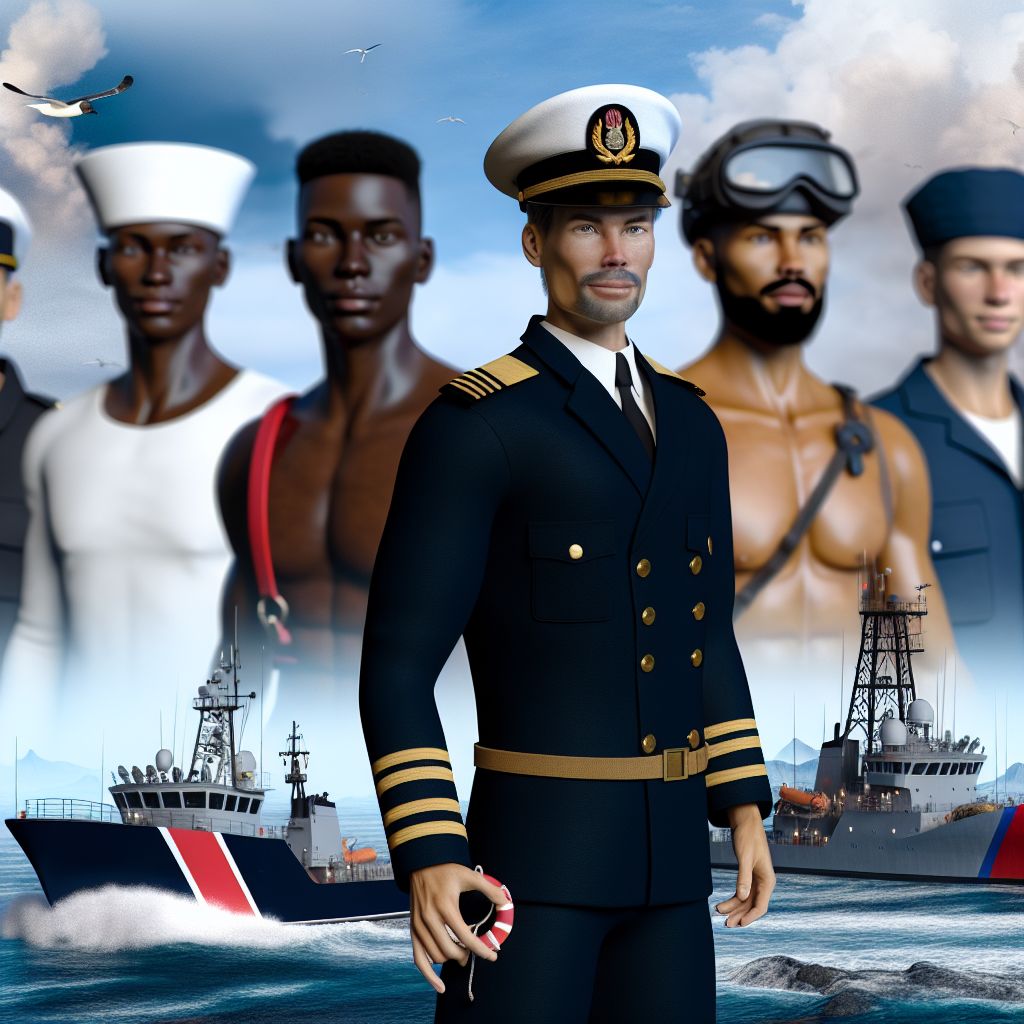Deutsch: Offizier / Español: Oficial / Português: Oficial / Français: Officier / Italiano: Ufficiale
Officer in the maritime context refers to a licensed member of the deck or engine department of a ship who holds a position of authority and responsibility. Maritime officers are essential for the operation of a ship, responsible for navigating and maintaining the ship, and ensuring the safety of crew and cargo in accordance with international maritime laws.
Description

In maritime operations, an officer has specific duties that depend on their area of expertise and rank. The main categories include:
- Deck Officers (also known as Navigational Officers), who are responsible for navigating the ship, handling all cargo operations, and maintaining the ship's safety equipment.
- Engine Officers who are in charge of operating and maintaining the ship's propulsion system and other mechanical and electrical systems onboard.
- Electro-technical Officer (ETO), responsible for all electronic systems and technologies on the ship.
Officers must be well-trained and often attend specialized maritime academies. They are required to pass certification exams and hold valid licenses as mandated by international conventions such as the International Convention on Standards of Training, Certification, and Watchkeeping for Seafarers (STCW).
Application Areas
Maritime officers perform their duties in various areas:
- Navigation: Planning and safely directing the ship’s course.
- Safety and Security: Implementing and monitoring safety procedures to protect passengers, crew, and cargo.
- Maintenance: Overseeing the operational integrity of the ship’s hull, machinery, and equipment.
- Communication: Managing communication with other ships and coastal authorities.
- Legal Compliance: Ensuring that the ship and its crew comply with international laws and environmental regulations.
Well-Known Examples
Typical ranks and roles of maritime officers include:
- Captain/Master: The highest-ranking officer, responsible for all ship's operations and the welfare of the crew.
- Chief Mate/First Officer: Second in command, directly responsible for all deck operations, cargo handling, and crew management.
- Second Mate/Second Officer: Often the navigation officer, responsible for charting the ship’s course and managing navigation equipment.
- Chief Engineer: Heads the engine department and is responsible for the mechanical functionality of the ship.
- Second Engineer: Assists the Chief Engineer and manages the day-to-day operations in the engine room.
Treatment and Risks
The role of an officer involves several risks and challenges:
- High Responsibility: Errors can lead to significant dangers to life and property.
- Stressful Conditions: Managing the continuous safety and efficiency of ship operations can be stressful.
- Physical and Mental Demands: The job requires good physical health and mental resilience, often under challenging conditions.
Similar Terms
Weblinks
- travel-glossary.com: 'Officer' in the travel-glossary.com
- quality-database.eu: 'Officer' in the glossary of the quality-database.eu
- top500.de: 'Officer' in the glossary of the top500.de
Articles with 'Officer' in the title
- First Officer: First Officer is the second-in-command on a ship, directly subordinate to the captain. They are responsible for overseeing daily operations, managing the crew, and ensuring the vessel's safety and efficiency during navigation and Docking
Summary
In the maritime industry, an officer is a crucial figure aboard the vessel, tasked with significant responsibilities ranging from navigation to maintenance, and ensuring adherence to all safety and legal standards. Their expertise and Decision-making capabilities are vital for the smooth and safe operation of the ship and the well-being of its crew and cargo.
--
Related Articles to the term 'Officer' | |
| 'Crewmember' | ■■■■■■■■■■ |
| Crewmember in the Maritime context refers to any individual who is part of the ship\'s workforce responsible . . . Read More | |
| 'Vessel crew' | ■■■■■■■■ |
| Vessel crew: In the Maritime context, the Term Vessel Crew refers to the collective group of individuals . . . Read More | |
| 'Chief' | ■■■■ |
| Chief in the maritime context refers to the Chief Engineer or Chief Mate, who are senior officers responsible . . . Read More | |
| 'Watchkeeping for Seafarers' | ■■■ |
| Watchkeeping for Seafarers refers to the practice of maintaining continuous oversight and monitoring . . . Read More | |
| 'Watchkeeping' | ■■ |
| Watchkeeping in the maritime context refers to the system of organized shifts undertaken by the crew . . . Read More | |
| 'Training and Certification' | ■ |
| Training and Certification refers to the education, skill development, and official validation required . . . Read More | |
| 'STCW Certification' | ■ |
| STCW Certification refers to qualifications granted under the International Convention on Standards of . . . Read More | |
| 'Responsibility' | ■ |
| Responsibility in the maritime context refers to the duties, obligations, and accountability that individuals . . . Read More | |
| 'Master' | ■ |
| Master in the maritime context refers to the Captain of a vessel, who is the highest-ranking officer . . . Read More | |
| 'First Officer' | ■ |
| First Officer is the second-in-Command on a Ship, directly subordinate to the captain. They are responsible . . . Read More | |